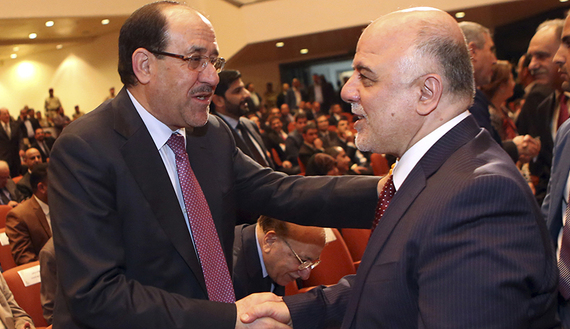Abadi to break up with Maliki, form new party for next elections: newspaper

Iraq’s Vice President Nouri al-Maliki (L) and new Prime Minister Haider al-Abadi shake hands during the session to approve the new government in Baghdad, September 8, 2014.Iraq’s parliament approved a new government headed by Haider al-Abadi as prime minister on Monday night, in a bid to rescue Iraq from collapse, with sectarianism and Arab-Kurdish tensions on the rise. REUTERS/Hadi Mizban/Pool (IRAQ – Tags: POLITICS) – RTR45G35

Baghdad (IraqiNews.com) Iraqi Prime Minister Haider al-Abadi will break up with his party and form a new entity for the upcoming parliamentary elections, a newspaper reported on Wednesday.
London-based The New Arab quoted a political figure close to Abadi saying that the prime minister was close to declare Tahrir wal Benaa (liberation and construction), to run the elections independently from the Islamic Daawa party, where Vice President Nouri al-Maliki serves as a secretary-general.
Abadi has managed to incorporate 130 members of Islamic Daawa and other parties into his new party, the source told the newspaper. He also won the backing of several leaders of the Popular Mobilization Units, the Shia-led paramilitary force backing the government troops. The latters will give up armed role in order to be able to run the elections, according to the source.
Mansour al-Baiji, a member of Maliki’s State of the Law coalition, which contains Islamic Daawa, said the party will run the elections through two separate lists led by Abadi and Maliki.
He pointed to divisions and resignations rocking the broader Iraqi National Alliance, the umbrella bloc that incorporates the country’s largest Shia entities.
Iraq has yet to specify a date for legislative elections intended for 2018.
Observers believe Maliki, a close ally to Iran and Iraq’s top Shia clergy, has obviously been preparing to return for competition over government premiership, which he lost in 2014 to political and popular pressures after Islamic State militants took over a third of the country.
Late Tuesday, Ammar al-Hakim, chief of the Iraqi National Alliance, also withdraw from his post as the head of the Islamic Supreme Council, another component of the Shia alliance.
